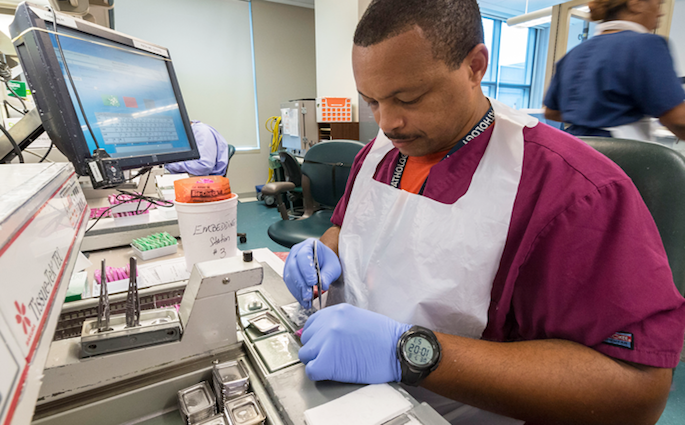Johns Hopkins is the leading pancreatic cancer research center in the world.
The team at Johns Hopkins has taken a deeply collaborative approach to pancreatic cancer research, and as a result, have been leaders in pancreatic cancer research for the last three decades.
Their accomplishments have spanned the full range of research in pancreatic cancer, including: the causes of inherited forms of pancreatic cancer, disease screening, novel early detections strategies, elucidating the genetics and biology of pancreatic cancers and precursor lesions, and the development of personalized therapeutics. Some of these accomplishments are highlighted below:
Developed the first blueprint of the genes that drive development of pancreatic cancer.
Sequencing all of the known genes in a series of pancreatic cancers, the team at Johns Hopkins were able to identify the crucial acquired genetic alterations necessary for the development of pancreatic cancer. This knowledge is the foundation of continued developments in the diagnosis and treatment of pancreatic cancer.
Developed a blood test to detect pancreatic cancer early.
Using knowledge gained from their blueprint of key genes, the team developed a novel blood test to detect pancreatic cancer before a patient develops symptoms. This blood test is now being evaluated in a large clinical trial.
Developed a test to evaluate cystic precancerous lesion in the pancreas.
The team developed a new test to evaluate cystic precancerous lesions, balloon-line spaces in the pancreas that can develop over time into cancer. These precancerous lesions can be detected on CAT scans, however, knowing which ones will develop into cancer and should be removed surgically is very difficult. The new test will help determine which lesions will likely progress and should be removed, thereby, preventing cancer and unnecessary surgery.
Discovered inherited genes that increase the risk of pancreatic cancer (“familial pancreatic cancer genes”).
Sequencing all known genes in more than 600 patients with a familial form of pancreatic cancer the team identified new genes that increase risk of pancreatic cancer. This knowledge is essential to future efforts to identify patients at high-risk of pancreatic cancer and prioritize them for cancer screening. Knowing these genes allows doctors to quantify risk and to prioritize carriers of one of these genes for cancer screening.
Awards and Honors
What we hope to achieve
Both art and science, “hold, as ‘twere, the mirror up to nature.”
– William Shakespeare, Hamlet, III


